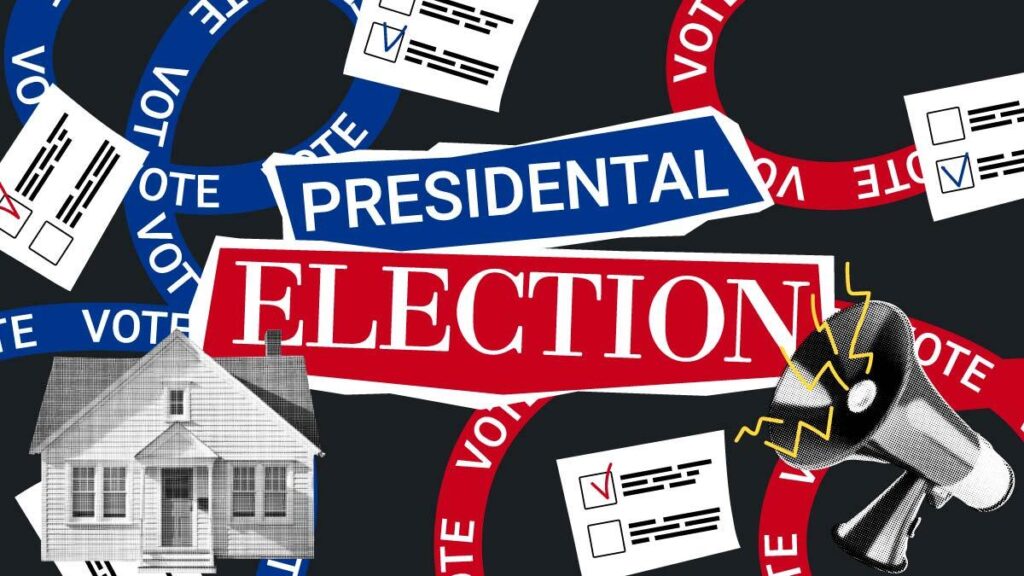[ad_1]
She also unveiled a plan that would offer $25,000 in downpayment assistance for first-time homebuyers, and publicly stated that “some” corporate landlords are responsible for rent increases that are exacerbating affordability issues.
On the Republican side, former President Donald Trump has most consistently aimed to tie the issue of housing shortages and lack of affordability to immigration. Trump contends that an influx of undocumented immigrants serves to drive demand — and prices — higher, creating challenges for citizens in securing an affordable place to live.
Former Trump White House officials and industry trade groups have also said they expect he would attempt to sharply reduce the regulatory costs in mortgage and real estate, and many expect him to try to remove Fannie Mae and Freddie Mac from conservatorship.
Different perspectives
One of the more substantive housing debates to emerge this election cycle was between the vice presidential candidates from their only debate in October. Walz and Republican vice presidential nominee Sen. JD Vance (Ohio) each emphasized the different elements of their running mates’ housing plans, with Walz speaking a lot about a housing shortage and the need to view housing as less of an outright commodity, while Vance echoed Trump’s key talking point.

“25 million illegal aliens competing with Americans for scarce homes is one of the most significant drivers of home prices in the country,” Vance said during the debate. “It’s why we have massive increases in home prices that have happened right alongside massive increases in illegal alien populations under Kamala Harris’s leadership.”
It’s difficult to determine how much of a motivator housing will be in getting voters to the polls. Most scientific polls characterize the presidential race as a dead heat, with leads between the two candidates often falling within margins of error. There are signs that housing is an issue on the minds of Gen Z voters, particularly as it relates to affordability.
Vance has spoken a lot in the past about issues he sees with the housing situation in the U.S., with some of his populist-driven rhetoric drawing comparisons to the way Democrats typically talk about institutional activity in housing from policy experts. Trump has also signaled certain intentions that could impact U.S. housing, including a desire to have more influence at the Federal Reserve and a repeated intention to privatize the government-sponsored enterprises (GSEs).
The conservative think tank the Heritage Foundation also published a potential policy playbook for a second Trump administration called “Project 2025,” which featured a series of specific housing proposals bylined by former Trump-era HUD Secretary Ben Carson, but the campaign and candidate have distanced themselves from it and insisted that it will not have bearing on sought policy priorities.

Democrats disagree, and have seized on the proposals to cast Republican policy priorities broadly as “extreme” when compared to the desires of most voters.
There has been surprisingly little movement in the polls for the presidential race since Harris entered the fray, despite gaffes from either side, an assassination attempt on Trump and other controversies.
Each candidate has different strengths according to voters, with Trump generally having an advantage on the issues of immigration and the economy while Harris is seen as the better choice on reproductive health and defending democracy.
When it comes to housing, however, a recent Bloomberg poll indicated that Americans see Harris as potentially more beneficial in addressing housing costs. Real estate and mortgage pros, however, seem to favor Trump.
Congress
In the races for the legislative branch — in which all 435 House seats and 33 Senate seats are up for grabs — housing has a part in the conversation but to a lesser degree than the presidential race.
Among Democrats, members of the House and Senate have introduced several potential bills for debate in either chamber aimed at spurring construction and expanding affordability. Republicans have been more focused on lowering regulatory burdens, in September introducing a bill that would expand the oversight of federal housing programs, make changes to loan officer compensation for the origination of small-dollar mortgages, and create additional counseling requirements for homebuyers.
Around the same time, House and Senate Democrats introduced an ambitious $30 billion housing bill that would construct and preserve affordable housing, and would seek to create a new national housing development authority to provide an “alternative to a market dominated by corporations and investors with deep pockets.”
It would also repeal the Faircloth Amendment, which imposed limitations on the number of affordable housing units the government could build. It has prevented any net increase in public housing stock from the number of units maintained by the government as of Oct. 1, 1999, requiring public housing agencies to either remove units or consolidate existing ones to limit the number of units the government has on its books.
It’s unclear how voters will break on these issues in the congressional races. Pollsters and political operatives seem to agree that Democrats will have a harder time maintaining a majority in the Senate due to high-profile retirements and endangered incumbents, but the House is harder to predict due to the extremely narrow divisions in that chamber.
But at least on the housing front, there is more agreement between the political parties on these issues than some others driving forward the election debate.
In California, rent control is on the ballot yet again. If passed, Proposition 33 would repeal a state law that prevents local governments from enacting rent increase limits on most single-family homes and on housing built after 1995. Supporters say the legislation will give municipal leaders a way to help reduce extreme housing costs. Opponents say it would discourage new construction, exacerbating existing issues.
[ad_2]
Source link

